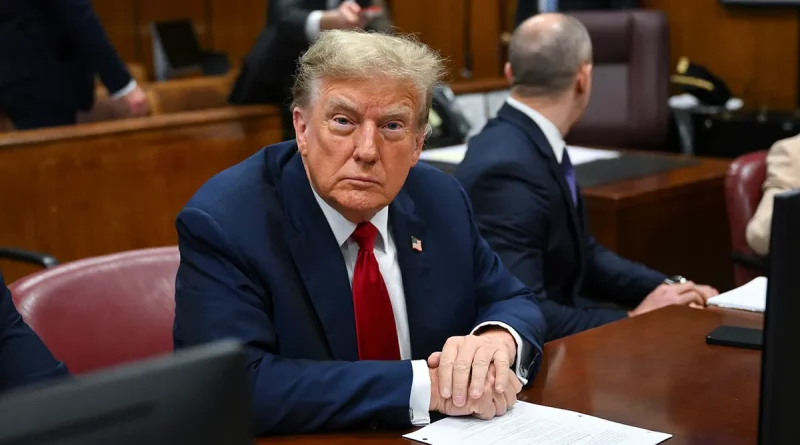Juror dismissed from Trump hush money trial as prosecutors seek to hold former president in contempt
0 seconds of 1 minute, 45 secondsVolume 90%
A juror in Donald Trump’s hush money trial was dismissed Thursday after expressing doubt about her ability to be fair and impartial, and the status of a second New Yorker picked for the panel was in limbo amid concerns that some of his answers in court may not been accurate.
The setbacks in the selection process emerged during a frenetic morning in which prosecutors also asked for Trump to held in contempt and fined over a series of social media posts this week, while the judge in the case barred reporters from identifying jurors’ employers.
The seating of the full jury — whenever it comes — will be a seminal moment in the case, setting the stage for a trial that will place the former president’s legal jeopardy at the heart of the campaign against Democrat Joe Biden. The trial will also feature potentially unflattering testimony about Trump’s private life in the years before he became president.
The jury selection process picked up momentum Tuesday with the selection of seven jurors. But on Thursday, Judge Juan Merchan revealed in court that one of the seven, a cancer nurse, had “conveyed that after sleeping on it overnight she had concerns about her ability to be fair and impartial in this case.” And though jurors’ names are being kept confidential, the woman said her family members and friends questioned her about being a juror.
Prosecutors also raised questions about a second juror, a man who works in information technology, saying they had located an article from the 1990s about a man with the same name as the juror being arrested for tearing down political advertisements in suburban Westchester County. The posters were on the political right, prosecutors said.
The man said under questioning this week that he had not been convicted of a crime. Merchan asked the juror to come to court Thursday morning for additional questioning.
Twelve jurors and six alternates must be seated to hear the trial. Merchan said Tuesday that opening statements could begin as soon as Monday.
The process of picking a jury is a critical phase of any criminal trial but especially so when the defendant is a former president and the presumptive Republican nominee. Prospective jurors have been grilled on their social media posts, personal lives and political views as the lawyers and judge search for biases that would prevent them from being impartial.
Inside the court, there’s broad acknowledgment of the futility in trying to find jurors without knowledge of Trump. A prosecutor this week said that lawyers were not looking for people who had been “living under a rock for the past eight years.”
But Thursday’s events laid bare the inherent challenges of selecting a jury for such a landmark, high-publicity case. After dismissing the nurse from the jury, Merchan ordered journalists in court not to report prospective jurors’ answers to questions about their current and former employers.
He said that “as evidenced by what’s happened already, it’s become a problem.” The answers also will be redacted from court transcripts.
Prosecutors had asked that the employer inquiries be axed from the jury questionnaire. Defense lawyer Todd Blanche responded that “depriving us of the information because of what the press is doing isn’t the answer.”
The district attorney’s office on Monday sought a $3,000 fine for Trump for three Truth Social posts they said violated the order. Since then, though, prosecutors say he’s made seven additional posts that they believe violate the order.
Several of the posts involved an article that referred to former Trump lawyer Michael Cohen as a “serial perjurer,” and one from Wednesday repeated a claim by a Fox News host that liberal activists were lying to get on the jury, said prosecutor Christopher Conroy.
Trump lawyer Emil Bove said Cohen “has been attacking President Trump in public statements,” and Trump was just replying.
The judge had already scheduled a hearing for next week on the prosecution’s request for contempt sanctions over Trump’s posts.
The trial centers on a $130,000 payment that Trump’s lawyer and personal fixer, Michael Cohen, made shortly before the 2016 election to porn actor Stormy Daniels to prevent her claims of a sexual encounter with Trump from becoming public in the race’s final days.
Prosecutors say Trump obscured the true nature of the payments in internal records when his company reimbursed Cohen, who pleaded guilty to federal charges in 2018 and is expected to be a star witness for the prosecution.
Trump has denied having a sexual encounter with Daniels, and his lawyers argue that the payments to Cohen were legitimate legal expenses.
Trump faces 34 felony counts of falsifying business records. He could get up to four years in prison if convicted, though it’s not clear that the judge would opt to put him behind bars. Trump would almost certainly appeal any conviction.
The hush money case is one of four criminal prosecutions involving Trump as he vies to reclaim the White House, but it’s possible that it will be the sole case to reach trial before November’s presidential election.
Appeals and other legal wrangling have caused delays in cases charging Trump with plotting to overturn the 2020 election results and with illegally hoarding classified documents.
